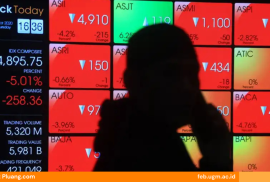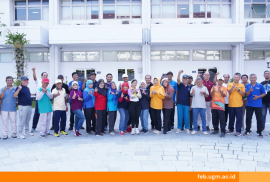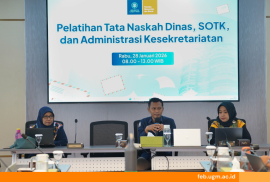The Chief Executive of Financial Services Authority (OJK) for the Supervision of Financial Services Business Conduct, Education & Consumer Protection, Dr. Friderica Widyasari Dewi, mentioned that millennials and Generation Z are particularly susceptible to falling into online loans (pinjol) and fraudulent investment traps. This generation is financially vulnerable due to their lifestyle, which tends to spend more on leisure than saving or investing.
“Many young people get trapped in online loans because they borrow for consumptive needs and imprudent purposes,” said the FEB UGM alumnus on Thursday (6/6) via a video recording presented at the Bisnis Indonesia Goes to Campus (BGTC) 2024 event at the Faculty of Economics and Business, UNiversitas Gadjah Mada (FEB UGM).
Dr. Friderica Widyasari Dewi, familiarly known as Kiki, stated that millennials and Gen Z face financial issues, including fraudulent investments, due to the principles of “You Only Live Once” (YOLO) and “Fear Of Missing Out” (FOMO). The FOMO lifestyle makes people feel left out if they don’t follow trends, while the YOLO lifestyle is associated with maximizing and freely enjoying life. These principles lead the younger generation to poor decisions, such as not preparing emergency funds.
Kiki mentioned that this vulnerability is also triggered by their habit of frequently sharing personal information on social media. This behavior is hazardous, yet they are unaware of it. For example, posting their ID cards, home addresses, and other personal information that irresponsible parties could exploit.
Additionally, Kiki explained that the FOMO attitude also leads the younger generation to fall into fraudulent investments. Without adequate financial and investment understanding, this group often falls victim to enticing promises. They usually mimic what influencers or their idols do, including financial advice.
As the Chairman of the Alumni Association of the Faculty of Economics and Business, Universitas Gadjah Mada (KAFEGAMA), Kiki urged students to understand financial planning aspects. Students are part of the next generation who will build Indonesia. With Generation Z and millennials making up more than half of Indonesia’s population, this group is critical economic players who need to be equipped with adequate financial understanding.
Meanwhile, the National Financial Literacy and Inclusion Survey (SNLIK) conducted by OJK in 2022 noted that the younger generation in Indonesia has low financial literacy and inclusion rates. The financial literacy rate for the 15-17 age group is 43 percent, while their financial inclusion rate is 69 percent. These figures are far below the national financial literacy and inclusion rates of 49.7 percent and 85 percent, respectively.
Therefore, Kiki emphasized the importance of increasing financial literacy and inclusion among the younger generation. This step is expected to keep them away from fraudulent investments and illegal online loans.
Multi-Party Collaboration
The Head of the Financial Services Authority (OJK) of Yogyakarta Province, Parjiman, stressed the need for collaboration from various parties to improve financial literacy and inclusion in Yogyakarta. Collaboration should involve the government, financial services industry players, media, and universities.
This effort is necessary to narrow the gap between financial literacy and inclusion. Higher financial inclusion compared to literacy means more people are using financial products and services without adequately understanding the risks.
The 2022 National Financial Literacy and Inclusion Survey (SNLIK) recorded that the financial literacy index of the Indonesian population was 49.68%. This means only half of the population is well-educated about financial products and services. “Out of every 100 people, only 50% are well-educated about financial products and services, while the other 50% remain uninformed,” he explained.
According to Parjiman, the financial literacy index of the Indonesian population needs to be improved, including in Yogyakarta. The financial literacy index in Yogyakarta reached 54.55%, which is higher than the national average. “We need to increase financial inclusion as it is slightly below the national average at 82.68%,” he said.
Therefore, Parjiman appreciated the BGTC 2024 event held at FEB UGM. He viewed this event as a good form of collaboration to enhance public education and literacy, especially regarding financial products and services.
Meanwhile, the Vice Dean for Research, Community Service, Cooperation, and Alumni of FEB UGM, Gumilang Aryo Sahadewo, Ph.D., welcomed the BGTC 2024 event. He hoped that this event could improve students’ understanding and soft skills, primarily related to finance and investment.
“Financial and investment literacy are competencies that Indonesian human resources must possess. We hope that students can gain knowledge and soft skills related to financial and investment literacy through this event,” he explained.
Reportage: Kurnia Ekaptiningrum
Watch the entire event via https://www.youtube.com/@BisnisTV
Sustainable Development Goals








